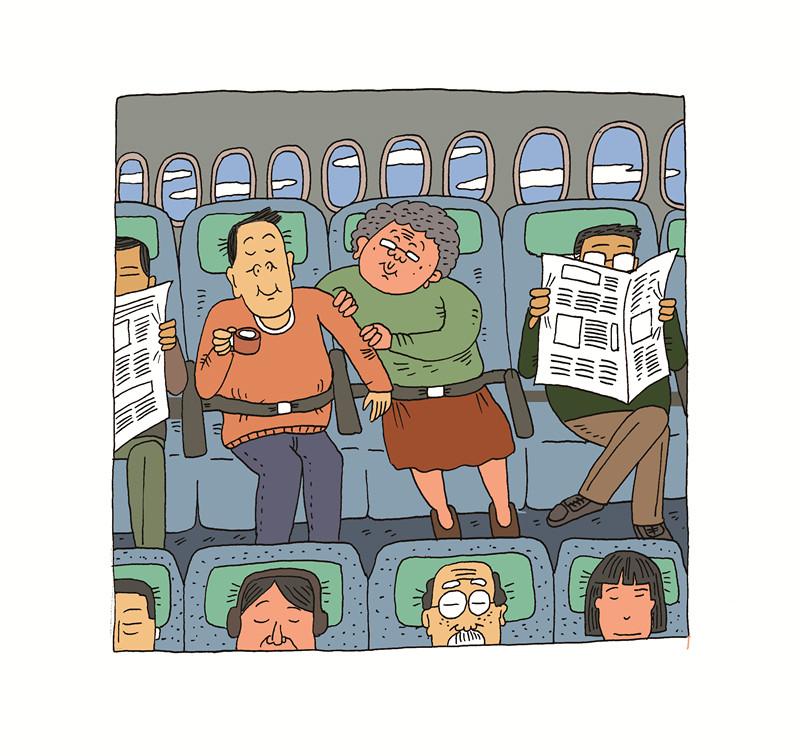he tugged and pulled at the young man’s fingers. She took his earlobes between her thumb and forefinger and gently rolled them until they were baby pink. She even smacked his kneecaps as if trying to repel some evil spirit from the poor bloke’s body. Yet, she was a stranger to him. This much I knew since I’d heard him clearly introduce himself as the plane filled up and she sat next to him.
“How sweet,” said my boyfriend, assuming that this was the young man’s grandmother and their flight from Guangzhou to Beijing one of a thousand journeys they’d spent like this. “No, you don’t understand – they just met,” I corrected him, and he stared at me blankly and before meeting the possibly desperate gaze of the boy sitting across the aisle. “I think he likes it,” he said, “this sense of community is what I like about China, you wouldn’t see that back home!”
He was right, this was a China-specific experience that couldn’t be matched. As we started our ascent to the rhythm of a 80-year-old woman massaging a 20-year-old who was by now practically reduced to tears beneath her strong hands, it got me thinking – why is it that our sense of personal space is so important to us and what does it say about our cultures?
There are theories that I’ve read up on about our sense of personal space deriving from our sense of community. Whether you’re part of a collectivist community or an individualist one defines how close people stand next to each other when waiting in line. To me there is something about the way that China specifically ignores our personal bubbles that remains unparalleled.
My brushes with unwanted close contact here have been numerous. To start with, I’m far from the first foreigner to mention the photo fanatics who go to extreme lengths to get in a photo with you. Sometimes, it’s just pulling you aside as you walk along the banks at the Summer Palace and snapping a pic before you realize. Or on the subway, either without your knowledge or with the bravest teenagers choosing to ask. Of course, all this comes from curiosity and by no means contains even a hint of bad intention. Though the forced photo shoots might be dying out, getting used to other invasions of personal space is the first step to becoming a truly zen alien.
Another type of intrusion happens here every single day on our commutes. The subway in China doesn’t just exemplify how so many people can participate in a single action at one moment, but that just because someone is quite literally in your face, they will still do little to assist you in any matter. This is where confusion really sets in: surely as a collectivist society the sense of community should mean everyone is constantly sticking up for each other, but on the subway you’re met with dozens of people who live by the motto “I come first.” Waiting in lines goes out the window and I once witnessed a lady lose her shoe in the abyss of the crowd as she tried to get off at her stop. Kudos to her, she didn’t make any fuss and just hobbled on to her transfer without her right stiletto as if it was any regular Tuesday.
The competition for space, this sense of community and the assumption that everyone is on the same team, mixed with the reality that everyone is only going to be helpful when it’s their family or close friends involved is, well, very confusing. In London, the “don’t talk to me” vibe is permanent. Here, someone may have their nose in a Korean drama one second, be grabbing you for a selfie the next and then pushing you away as they get off at Dongzhimen. Maybe the conclusion to be drawn is that China is just far too diverse, and it’s too hard to generalize on why and what these invasions on personal space mean. From a history of living in very close quarters like Beijing’s hutongs, maybe this mix of love thy neighbor, stand uncomfortably close to thy neighbor in the queue but also beat thy neighbor to a position in the outside loos was the norm all along.
I came back around from my wonderings on personal space with a loud smack to my foot. “Your feet need a rest – flying is very bad for them,” said our trusted 80-year-old companion as she leant across the aisle. Smack! She slapped my foot again as I came to realize what was happening. “Sorry, I don’t speak Chinese,” I lied, ashamed that I wasn’t ready to have my bubble burst so soon into a four-hour flight.

 Old Version
Old Version